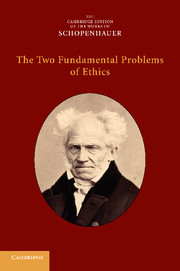Introduction
Published online by Cambridge University Press: 06 November 2009
Summary
In 1841 Arthur Schopenhauer published a book entitled The Two Fundamental Problems of Ethics (Die Beiden Grundprobleme der Ethik), containing a pair of complementary essays, which the present volume re-unites for the first time in English translation. The original publication of the essays was the culmination of a train of events that began in April 1837 when Schopenhauer found a prize competition advertized in the Halle Literary Journal (Hall'sche Litteraturzeitung). The challenge was to answer a question posed in Latin: Num liberum hominum arbitrium e sui ipsius conscientia demonstrari potest? that is, ‘Can the freedom of the human will be proved from self-consciousness?’ Writing largely in his native German, Schopenhauer answered that question in the negative, in a thoroughly argued, powerful and scholarly essay which situated his own contribution in relation to a broad sweep of philosophical and literary predecessors, and left room for the thought that the denial of freedom is ultimately unsatisfying because of our definite feelings of responsibility – responsibility for our character, our very being, he claimed, not for our particular actions, all of which are casually determined. He submitted this essay, On the Freedom of the Human Will (Über die Freiheit des menschlichen Willens) to the learned academy that had set the question, namely The Royal Norwegian Society of Sciences in Trondheim.
- Type
- Chapter
- Information
- The Two Fundamental Problems of Ethics , pp. xi - xxxixPublisher: Cambridge University PressPrint publication year: 2009

